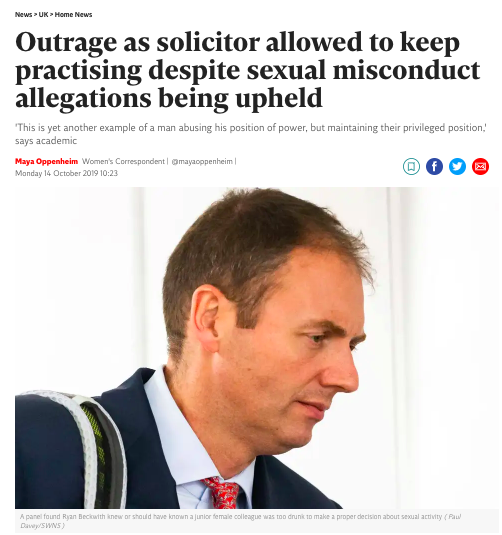SDT publishes Beckwith decision – what are the implications for law firms?
For those of you who followed the ex-Freshfield partner’s fall from grace last year, related to what was described as a “spontaneous” incident of “inappropriate conduct” with a junior lawyer following after-works drinks, the recently-published SDT decision will make fascinating reading. The fact that publication has taken so long gives some indication about the sensitivity of the topic, and implications for the profession.
You may recall that there was surprise from some quarters that Mr Beckwith “got away” with a mere fine of £35,000 (plus £200,000 costs), having been found guilty of lack of integrity and behaving in a way that failed to maintain public trust in himself and the profession. In a post #metoo environment, some were calling for a much harsher penalty – including parts of the national press (the image above is from The Independent article here).
However, the SDT concluded that, although Mr Beckwith should have known that “Person A” was intoxicated at the time of the incident, in going home with her he had not abused his position of authority, and there were no findings of fact that would have led to criminal prosecution. His behaviour was serious but, in effect, Mr Beckwith did not pose a future threat.
It does therefore keep the door open to harsher sanctions for those who do abuse their power in sexual misconduct cases. Expect more to come.
The Beckwith case, whatever you think of the outcome, also shines a light on the blurred lines between professional ethics and working hours. If there was any doubt, our ethical and regulatory responsibilities do not stop when we leave the office. The SRA is quite prepared to prosecute solicitors for ethical lapses in our private lives.
Do we need to look at drinking culture?
Alcohol was clearly an important factor in this case – and I’m sure, in many others that have not reached the SDT. Drinking culture is often accepted as part-and-parcel of being a lawyer. We drink to unwind at weekends. We drink to network. We drink to fit in with our colleagues and bosses. We drink to celebrate Christmas, birthdays, and successes. Leaving drinks, welcome drinks, team bonding drinks. The list goes on.
As law firm managers, the question becomes how do we reduce the ethical risks of alcohol-fuelled work events, without becoming the Fun Police? To what extent should a firm even attempt to get involved in extra-curricular activities?
These are big and uncomfortable questions, with no easy answers. If you look at the Codes of Conduct you could find justifications for both imposing strict alcohol policies, and leaving it to individuals’ professional judgement.
There is no right or easy answer.
It does however feel that there does need to be a rethink about alcohol-centred work events. Bars are not the only venues in town. Perhaps a little more creative thinking would actually be more of an event, more fun, more inclusive, and less risky.

Publicity rules under the new SRA Codes of Conduct
“Can we still connect with and sell to potential clients on LinkedIn?”This was an interesting question that came in this week – and one that is relevant to any firms that hawk their wares online.
Under the new Standards and Regulations, the publicity rules have been reduced to a single line in the Codes of Conduct:
I think we would all agree that this – quite rightly – would make cold calling, door-to-door selling and hospital-stalking against the rules. But what of making online connections?It is standard practice for lawyers to use social media to raise their profile, demonstrate expertise and network. LinkedIn is perhaps the most widely used business-to-business network. What if we target and directly approach a prospective client, out of the blue? Is that caught by the new rule?
Since people appear on LinkedIn in their individual capacity, they must count as “members of the public”. And, given its natural meaning, a direct message from a lawyer would indeed appear to be an “unsolicited approach”.
However, the key seems to me to be whether you contact that person with the intention of “advertising”.
I can’t for one second think that the SRA wants us to stop using social media for marketing purposes. But there are ways, and there are other ways, or making connections online. Consider these two approaches:
“Hi Englebert, I saw your profile and found it really interesting. I often write on here about legal stuff that might be relevant to you. Would you like to connect? I see we went to the same primary school. Remember Mrs Briggs??”
“Hi Esmerelda, I would like to connect with you, please. We’d love to have you as a client. We are awesome lawyers. How about giving us a shot? We will give you a hefty discount on the first transaction.”
OK, perhaps I need to amend my LinkedIn style – but the second example seems to me a fairly clear-cut example of an “unsolicited approach…in order to advertise legal services”.
The first option is more like networking. An opportunity to open a conversation and get to know the person before developing the business. I can’t see it causing any problems whatsoever.
What does the guidance say?
There is, of course, some recent SRA guidance on unsolicited approaches. It is one of the sixty-or-so pieces of guidance to come out of the regulator post-25th November. (Because the new rules are easy-peasy).
Does the guidance provide any help in this instance? In summary, the guidance says:
- The rule is not intended to ban all advertising. It is intended to catch approaches that “may feel unwelcome or intrusive”.
- “This means you cannot make direct or specifically targeted “approaches” to members of the public in person, by phone or via other means which target them individually.” LinkedIn would indeed be “other means”.
- What you are allowed to do is “advertise your services to the public so long as this is done in a non-intrusive and non-targeted way“.
HANG ON A MINUTE: non-targeted?? I am no digital advertising expert, but isn’t all online marketing built around the concept of targeting? That’s why platforms collect so much data about us.
On social media platforms, you can get really granular with your advertising based on personal information. Most firms no doubt use Google Ads – and Google knows everything about us. You can target by precise geography, gender, age, income etc.
And of course, you these platforms allow you to re-target individuals through placing cookies on their devices – you know that creepy feeling that a business is following you around the internet. Is that unsolicited? Unwanted? Intrusive? Quite possibly, yes!
This is no doubt one of those areas that the SRA would say “use your professional judgement”. But unfortunately the official guidance perhaps poses more questions than it answers.

Practice notes and guidance
- Brexit transition period: intellectual property – The Law Society
- Transaction (TA) forms – The Law Society
- Closure of the Solicitors’ Indemnity Fund – The Law Society – incredibly important for retiring solicitors.
- VAT treatment of disbursements and expenses – The Law Society – we finally get a bit more guidance on disbursements, following the uncertainty created by Brabners.
- OFSI guidance on sanctions updated post-Brexit – HM Treasury
- STEP guidance on the effect of GDPR on trusts and estates – STEP
- Guidance on non-disclosure agreements (NDAs) – Acas

Disciplinary decisions
- Neath solicitors Ieuan Michael Jones and David Walter Philips (compliance officer) struck off and suspended respectively, for grossly overcharging clients, many of whom were vulnerable surviving spouses. The interesting part about this case is that the compliance officer – who was less culpable for the overcharging – was nonetheless handed a year’s suspension for failing to step in. There is a lesson in there.
- Catherine Ann Sandbach struck off for dishonestly telling clients she had progressed their cases in order to “buy time” for herself. This is another case where on the face of it, pressure of work and lack of support may have contributed to unethical behaviour.
- Derwent William Moger Campbell cleared of misconduct for “accidentally overcharging” an estate of which he was an executor. The judgement contains an interesting consideration of the valid basis of solicitors’ fixed fee charges in probate cases.
- Mohammed Yasin (non-lawyer owner and director of an ABS) banned from the profession for making improper payments of over £3m from client account, in property transactions which bore “the hallmarks of fraud”.
- Zeeshan Saqib Mian fined £20,000 for failing to undertake basic background checks on a disbarred barrister consulting to his firm. Always check the regulated status of your consultants!

Are you recruiting? Talk to us about our great value headhunting and job placement







